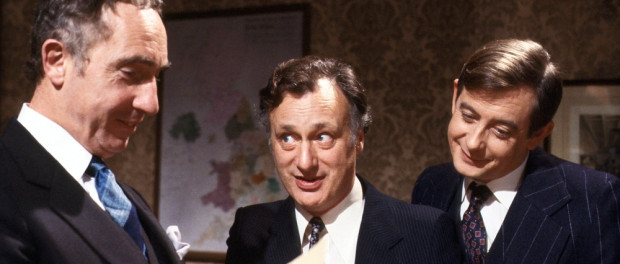Book of the Month Club: A Very Courageous Decision by Graham McCann
What Britain’s Best Sitcom should have been
 Publicity photo for Yes Minister. Left to right: Nigel Hawthorne, Paul Eddington, and Derek Fowlds. Credit: BBC/JonathanLynn.comYes Minister
Publicity photo for Yes Minister. Left to right: Nigel Hawthorne, Paul Eddington, and Derek Fowlds. Credit: BBC/JonathanLynn.comYes Minister
“Sir Humphrey: Bernard, ministers should never know more than they need to know. Then they can’t tell anyone. Like secret agents, they could be captured and tortured.
Bernard: You mean by terrorists?
Sir Humphrey: By the BBC, Bernard.”
(Series 1, Episode 7: “Jobs for the Boys”)
While newer political comedies contain regular crudities and a self-absorbed cynicism, Yes Minister and its successor, Yes, Prime Minister’s sharp observation and acting trumps them all. Its impact on government and the general public, as well as the political genre on television in general can barely be denied at this point. From the British news still dropping references from it on a regular basis (“it’s like a Yes Minister episode, isn’t it?”) to the former resident cat of 10 Downing Street named Humphrey after the civil servant, Antony Jay and Jonathan Lynn’s satire is still alive and kicking as it was thirty-five years ago. Strangely enough, it came only sixth in a search for Britain’s Best Sitcom. Most people know, however, it should have come first.
Yes Minister and its sequel was based on a simple premise, aptly summarised by one of the actors: three men sitting around a table talking about government. One man was a government minister; the second, a high-ranking civil servant; the third, another civil servant doubling as private secretary to the minister. Hilarity ensues. The series’ characters were brilliantly portrayed by Paul Eddington (Jim Hacker, the minister), Nigel Hawthorne (Sir Humphrey Appleby, the high-ranking civil servant), and Derek Fowlds (Bernard Woolley, the civil servant cum secretary). The laughter, unlike recent comedies, is real; each episode was filmed in front of a live audience. As episodes bordered and were even based on real life events, people in and out of the corridors of power took note, and was Margaret Thatcher’s favourite television show, for better or for worse.
Graham McCann’s book looks at the formation, the run, and what happened after Yes Minister and its sequel Yes, Prime Minister, all with a broader view of its legacy. It’s a combination of the witty and scarily accurate writing by its writers, the rapport between the three principal actors, Gerald Scarfe’s wickedly distorted drawings, and the perfect timing of the series during the Thatcher years. McCann describes the series’ development before its airing, and then goes season by season. Dwelling over certain episodes more than others, he peppers parts of scripts throughout. More importantly, he charts character growth in a way one might not be able to catch amidst the laughter and (binge) watching. A chapter is dedicated to the stage play made back in 2010 and the ill-fated six-part series revival that stemmed from it. Though most information won’t faze diehard fans, especially the information about the sources of the series, there are some interesting anecdotes regarding rehearsals, performances, and group dynamics that aren’t readily apparent in the final cut of the series.
For fans of the sitcom, curling up with the book is akin to seeing an old friend after a long time. It is a clever, insightful book. Very much recommended.





